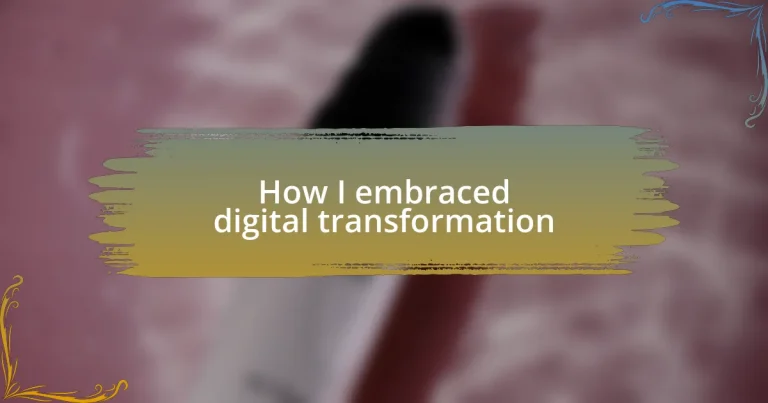Key takeaways:
- Digital transformation involves a cultural shift, enhancing both content and audience engagement through new technologies.
- Key technologies like mobile apps, augmented reality, and AI have revolutionized alcohol reviews by streamlining processes and enriching user experiences.
- Challenges during the transition included mastering new tools, maintaining authenticity, and addressing data privacy concerns.
- Lessons learned included the importance of agility, the value of data analytics for content direction, and the benefits of collaboration with peers.
Author: Clara Whitmore
Bio: Clara Whitmore is an acclaimed author and storyteller known for her captivating narratives and richly drawn characters. Her work spans several genres, including contemporary fiction and historical romance, often weaving elements of personal experience into her writing. Clara holds a Master’s degree in Creative Writing from the University of Edinburgh and has published three novels, which have garnered critical acclaim and a loyal readership. When she’s not writing, Clara enjoys exploring quaint bookstores and hosting literary workshops. She currently resides in Portland, Oregon, with her dog, Jasper.
Understanding digital transformation
Digital transformation is more than just integrating new technologies; it’s a cultural shift that demands adaptability and innovation. I remember when I first started exploring how digital platforms could elevate my approach to alcohol reviews. It felt like standing on the edge of a vast ocean, wondering whether to take the leap or play it safe on the shore.
As I dove into this journey, I discovered that embracing digital tools meant not only enhancing my content but also connecting with a broader audience. Social media, for instance, allowed me to engage directly with readers, sparking conversations that enriched my understanding and appreciation of different beverages. Have you ever shared a drink recommendation with a friend online? That instant feedback can be invigorating, transforming a simple review into a shared experience.
In essence, digital transformation reshapes how we present and interact with information. It compels us to rethink our strategies, considering how each click and comment can influence our community. I’ve found that by adopting a more digital-centric approach, I can share my passion for alcohol in a way that resonates deeply with others, and that realization itself was incredibly empowering.
Key technologies in alcohol reviews
In the realm of alcohol reviews, utilizing platforms like mobile apps has transformed the experience for both reviewers and readers. I recall the first time I downloaded a drink-rating app; it felt as though I had a personal bar buddy in my pocket. This technology not only streamlined how I kept track of my tastings but also provided instant access to a community of enthusiasts. Have you ever wondered how some reviews catch fire online? It’s often because these platforms enable users to share insights and ratings quickly, amplifying voices that might otherwise go unheard.
Another key technology that has emerged is augmented reality (AR). I was skeptical at first; the idea of scanning a bottle to reveal detailed tasting notes seemed almost too futuristic. However, when I tried it during a wine tasting event, I was amazed. Suddenly, the bottle in front of me transformed into a digital gateway, showcasing its history, flavor profile, and even food pairings. Have you had a similar experience where technology changed your perception? That moment made me realize how AR can democratize knowledge, turning even the casual drinker into a more informed connoisseur.
Lastly, artificial intelligence (AI) in recommending beverages is a game-changer. I remember struggling to choose a new whiskey to try, feeling overwhelmed by options. When I started using AI-driven recommendation systems, I was surprised at how well they grasped my taste preferences. It felt like having a personal sommelier, guiding me to choices that genuinely resonated with my palate. This technology not only simplifies the decision-making process but also enriches our exploration of flavors, doesn’t it? Embracing these advancements has not only improved my reviews but also created a more enjoyable experience for readers seeking their next favorite drink.
Strategies for adopting digital tools
When I decided to embrace digital tools in my alcohol review journey, the first strategy I adopted was thorough research. I made it a point to explore various platforms and apps before committing to one. Have you ever felt overwhelmed by choices? I definitely have. By reading user reviews and comparing features, I discovered a platform that perfectly matched my needs, enhancing not just my reviewing process but also helping me connect with a wider audience.
Another vital strategy was to integrate user feedback into the digital tools I used. After publishing a few reviews, I sought input from readers on what they liked and what could be improved. This made a huge difference. When they suggested adding more visual content, I felt a surge of motivation to include photos and even short videos. Engaging with readers this way felt like a conversation, making my reviews more relatable and enjoyable for them.
Lastly, I explored automation tools to handle repetitive tasks. Initially, I was hesitant; I love the personal touch in my reviews. However, once I tried using scheduling tools for social media posts, I realized they freed up so much of my time. This allowed me to focus on writing more in-depth reviews instead of getting bogged down in logistics. Isn’t it fascinating how strategic use of technology can actually enhance creativity? By embracing automation, I could highlight more unique spirits, enriching the content of my site.
Personal journey in digital transformation
Adopting digital transformation was a personal journey that changed how I interacted with my passion for alcohol reviews. I remember the first time I uploaded a video review; my heart raced. Would my audience appreciate this new approach? Seeing the positive comments roll in was exhilarating, and it motivated me to explore even more creative avenues.
At one point, there was a significant challenge: learning to analyze data from my website traffic. It felt overwhelming, almost like reading a foreign language. But with time and persistence, I started to see patterns in what my readers enjoyed most. Recognizing these trends not only guided my content but also created a genuine connection with my audience. Have you ever felt that spark of clarity after tackling a difficult task? It’s rewarding.
Reflecting on this journey, I realize how crucial it was to shift my mindset. Instead of thinking of technology as an obstacle, I began to see it as a gateway to new possibilities. Automating aspects of my workflow wasn’t just about saving time; it was about enhancing the experience for my readers. It gave me space to infuse more passion into my reviews, which is what truly fuels my love for this craft. Embracing digital transformation opened doors I never knew existed.
Challenges faced during the transition
Transitioning to a digital-first approach introduced a range of unexpected challenges. For instance, I initially grappled with mastering new software tools needed for content creation and management. I vividly recall encountering a particularly frustrating editing program that left me feeling like I was trying to solve a puzzle without a picture. Have you ever faced a learning curve that tested your patience?
Another challenge was maintaining authenticity while adapting to online trends. I remember posting a review that was more flashy than what I typically produced, hoping it would appeal to a wider audience. Instead of the anticipated praise, I received mixed feedback, which made me question whether I was compromising my voice for views. It taught me that while adaptation is essential, staying true to my style is equally important.
Data privacy concerns also loomed large during this transition. As I started to collect data on my audience’s preferences, I found myself reflecting on the fine line between engagement and invasion. How much is too much when it comes to understanding my readers? This dilemma helped me establish a more respectful relationship with my audience, prioritizing transparency in my practices. Overcoming these challenges has ultimately shaped a more thoughtful approach to my work.
Lessons learned from digital transformation
Embracing digital transformation taught me the importance of agility. I vividly recall the moment I needed to pivot an entire marketing strategy because an unexpected trend surfaced. It was daunting, yet exhilarating, and I learned that flexibility is not just beneficial; it’s crucial for staying relevant in a fast-paced digital landscape. Have you ever had to make a swift change that ultimately worked out for the best?
I also came to appreciate the value of data analytics more deeply. Tracking engagement metrics on my alcohol reviews often felt overwhelming, but one particular instance stands out. I had been focusing my efforts on whiskey reviews, but the data revealed a surprising interest in craft beers. This shift not only broadened my content but also connected me more with my audience’s preferences. Isn’t it fascinating how numbers can guide our creative decisions?
Finally, collaboration emerged as another key takeaway from this digital journey. Partnering with fellow reviewers and digital marketers opened my eyes to new perspectives and strategies. I remember one project where we shared insights and resources that propelled all our efforts forward. Have you ever experienced the magic of collaboration? It’s a reminder that together, we can achieve more than we can alone.


